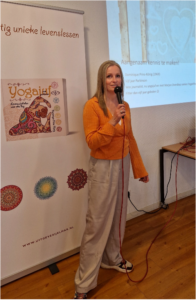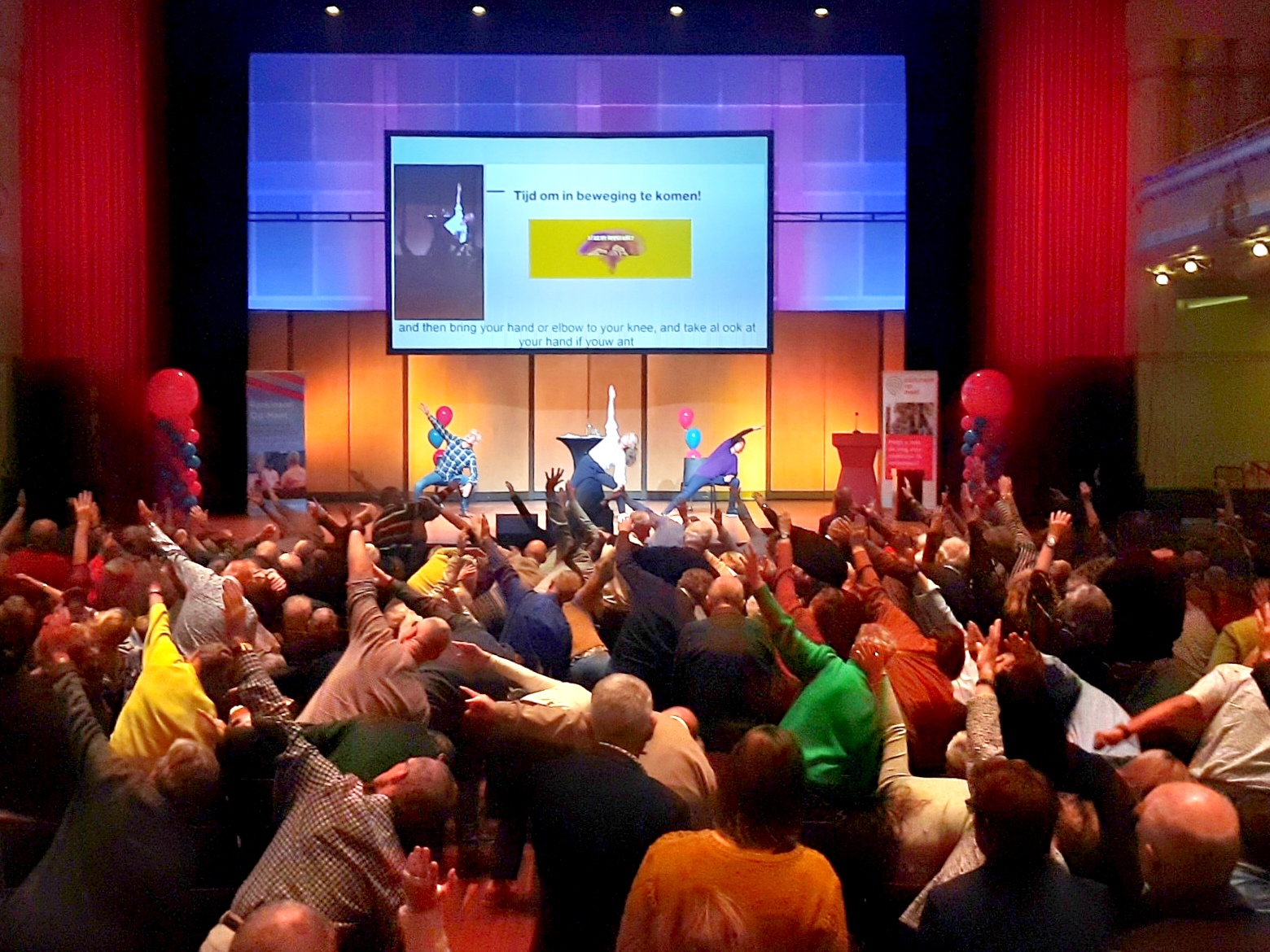An interview with Dominique Prins-König from Yoga4Parkinson in the Netherlands on September 26 2023 by George Ackerman, Ph.D, J.D.

Please tell me a little about your background.
I’m from Hoofddorp the Netherlands (a city very close to Amsterdam), 54 years old, got diagnosed 5 years ago, married, two sons that live nearby. I used to be a journalist and editor for magazines and newspapers, but pd made that hard to continue. I gave myself a sabbatical in 2020 (covid) and discovered that I would like to know more about yoga. I already practiced yoga in a yoga class one hour a week and had noticed that it helped me through a rough time when my 12 years younger brother got colon cancer in 2015 and died in 2016, at the age of 34. Yoga helped me deal with that incredible loss, by teaching me that deep sadness and sincere happiness can exist side by side. You don’t have to choose. Yoga also taught me to treat myself more mildly and with more compassion, without judging myself constantly.
So, I went to a great Dutch institute to study yoga, and soon I discovered that yoga and pd are a great combination. Yoga does not only bring suppleness to your body (to fight the stiffness from PD), but also calmness in your mind (to fight the stress of PD) and kindness in your heart (to help you be more friendly to yourself, even if your body and mind do not always act the way you wish they would). These are all things that can help you deal with PD, and may help you still enjoy the beautiful things in life, even with a @#$% disease as PD.
Can you tell me more about your advocacy?
Together with Marjan Overdiep and a nice group of volunteers (mostly people with pd) we run Yoga4Parkinson (www.yoga4parkinson.nl). With this organization we would like to inform people with pd about the great effects yoga can have, and we also train yoga teachers how to give yoga lessons to people with pd. We already trained about 70 yoga teachers all over The Netherlands, but we want that to be much more. Every person with PD should be able to follow Yoga4Parkinson classes nearby.
What is your passion and how did you get involved in Parkinson’s awareness and hope for a cure?
My passion (and profession) has always been writing, so one year after I was diagnosed, I wrote a book about that confusing time (‘De ongemakkelijke lessen van Mrs P.’). My new passion is yoga, so now I combine those two by writing about yoga. I wrote a book (‘Yogajuf met Parkinson’) about the life lessons I learned, and together with Marjan we wrote ‘Yoga4Parkinson het oefenboek’. This book contains lots of information about pd, yoga, and of course lots of yoga poses including cues and images. This book will be available in English soon.
What type of goals do individuals with Parkinson’s have when working with you?
I not only write about yoga and pd to make people more aware, I also train yoga teachers how to give yoga classes to people with pd, and I am a yoga teacher myself; on Monday and Friday I give yoga lessons to people with pd. I really love these moments, especially when I see that my ‘students’ become friends with their body again, can move more easily and above become really relaxed at the end of the lesson. The goals of these individuals are things like becoming less stiff, being able to deal with stress better, getting stronger, etc. The goals of the yoga teachers I train are to know more about pd and how they can implement this knowledge in their yoga courses.
What type of training and how long are the programs?
Yoga4Parkinson can be done by people with pd endlessly. Even if you are in a wheelchair, you can still do yoga and benefit from its effects like a calmer mind, better flowing energy, less cramping, etc. Even if moving your body is hard, you can still benefit from breathing techniques.
For yoga teachers the program is a course of one day, and a yearly training day to update their knowledge and exchange experience with other yoga teachers.
What effect can your advocacy have on an individual with Parkinson’s?
The effect we aim for is that people with pd notice that they can make their body stronger and more supple, and that they also can influence their mind, so that dealing with pd becomes a little easier. For me these effects are incredible; I feel stronger both physically and physically than when I was diagnosed 5 years ago. I wish all people with pd these effects and hope I can learn them to be a little kinder to themselves. I noticed that people with pd can be very harsh on themselves!
What would you like to see as a future goal for your advocacy?
I would like to see that everyone with pd knows about Yoga4Parkinson and the effects it can have, and off course I would like to see that every region in The Netherlands has enough yoga teachers who give Yoga4Parkinson classes. Not everybody has to do yoga, but everybody should be able to do so if they want.
What events do you participate in?
Together with Marjan and others I give presentations in Parkinsons Cafés, we were in Nijmegen at the Parkinson Weekend, we contributed to Parkinson TV, to the congress of ParkinsonNet, etc.
How does your advocacy also assist the caregivers?
More and more caregivers like physiotherapists, Parkinson nurses and neurologists acknowledge the benefits yoga can have on pd, so they see yoga as a beautiful addition to their own therapies. Caregivers like the people around someone with PD can benefit from yoga themselves, by doing it together for example, or by using yoga to take care of themselves.
How can someone get in touch? What is your website?
On www.yoga4parkinson.nl you can find more information. My email address is prinsdmh@ziggo.nl
How can others also become advocates for awareness?
If you’re comfortable with it, you could contact the media to share your story, and to show that having PD doesn’t mean you don’t exist anymore. By stepping forward instead of hiding and being ashamed we can show that pd has many different faces, and that there are still things you can do.
How can we better fundraise to support a cure for Parkinson’s?
In The Netherlands we have this great Parkinsons professor, Bas Bloem, who thinks of reaching the media repeatedly by informing the public about pd, about possible causes and about living your life with pd. He is a great connector which I think is important. Together we can reach higher than alone.
In your opinion what is the key to effective advocacy?
I think that sincerity and authenticity are most important. By sharing your own personal story, by making yourself humble and vulnerable you can reach people in their hearts. Also keep in mind that your story does not have to be the story of other people with PD; everyone has their own unique story to tell.
If you had one final statement or quote you could leave for the Parkinson’s community, what would it be?
Life doesn’t end when you are diagnosed with PD. It will get harder, but don’t get stuck in focusing on the limitations of the disease. Instead, try to focus on the things you still can enjoy, even if they are very small. It’s okay to feel sad and afraid, but not all day long. My brother was 33 years old and knew he was dying but was still determined to enjoy life as much as possible. If he could do that, so can you. My hashtag is #carpefuckingdiem.

